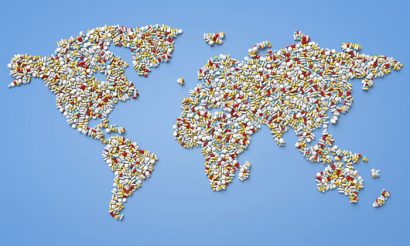Behind the numbers: The pharmaceutical industry and global health
Posted: 10 May 2017 | | No comments yet
IFPMA’s top analyst examines future trends, biotherapeutics and personalised medicine, and explains why the industry needs to examine its economic footprint…


The most indisputable of all facts on global health is that we’re living longer and healthier lives than ever, and in an era of continuous health improvement. What were once considered life-threatening diseases are now manageable conditions, and not just for patients, but for our health systems also.
Where Hepatitis C, for example, would have in the past required a long-term treatment and lately liver transplant that significantly reduced a patient’s quality of life, medical advances mean that 90-95% of patients can now be cured after receiving an 8-12 week treatment. Peptic ulcers, previously carrying a 300-day recovery post-surgery and a hefty $17,000 price tag, can now be simply treated thanks to the antibiotics ‘revolution’, keeping patients without the need for invasive surgery and expensive hospital beds for under $1,000.
Sustainable healthcare
What these figures unequivocally show is that improving patients quality of life and reducing health system pressures are both possible through the valuable contribution of the research-based pharmaceutical industry, ultimately leading to healthier, more productive and sustainable societies. The International Federation of Pharmaceutical Manufacturers and Associations (IFPMA) 2017 Facts & Figures report and microsite put forward a snapshot of this value using statistics that are difficult to contest, easy to remember, and an indispensable reference to explain how innovation must be fostered to continue generating this value for society.
Research and Development
The research-based pharmaceutical sector is one of the most innovative in the world, saving millions of lives. Literally billions of dollars are spent every year developing the drugs to combat HIV/AIDS, diabetes, cancer and other serious illnesses. More than software and computer services and other high tech industries. The effort is mammoth: of over 7,000 compounds under researcher’s microscopes in 2015, 56 were launched as new medicines.
Economic footprint


The report is built around three sections. The first deep-dives into statistics on the scale of pharmaceutical innovation. The second looks at the global health landscape and looks at increased life expectancy, decreased infant mortality and the scale of the budgetary burdens of aging populations.
Finally, the economic footprint of the pharmaceutical industry is quantified as positively affecting society and economic growth: from the 40% of the industry’s jobs created by IFPMA members alone, to the market expansion in “pharmerging” countries, to the global brand spending forecasted to reach $815 billion by 2021.
Positive progress
The research-based pharmaceutical industry has a unique role developing new and improved medicines to prevent and treat diseases. Five-hundred million people have been immunised since the turn of the century. Deaths from measles were down 79% between 2000-2014. HIV/AIDS related deaths have more than halved between 2005 and 2015, thanks to new treatments and better access for patients.
Strategic alliances


With results like this, we demonstrate our ongoing commitment to foster innovation, advance global health, and build strong strategic alliances across the world that benefit the whole of society. As an advocacy tool, this compendium of facts demonstrates that the pharmaceutical industry is here to improve the health of our populations and support the efficacy of our healthcare systems, working as one of the combination of vital actors needed at the global health table.
IFPMA members can bring the R&D and scaled outputs needed for us to be greater than the sum of our parts when we work together with systems and policy makers, to bring better healthcare to patients around the world.
Global health community
This is an exciting, quantifiable moment for healthcare advances, but the pharmaceutical industry must at the same time keep looking forward, constantly rethinking how to maximise positive impacts. This means continuing to work together with the other actors in the global health community, while doing what we do best: analysing the changes in patients’ needs and responding with new medicines to keep society healthy.
Rise in personalised medicine
For example, we will see a continuing rise in biotheraputics and personalised treatment as a proportion of all new drugs launched, as just one example of a responsive trend in the pharmaceutical pipeline.
Epidemic threat
As the industry also works together to become better prepared for global health threats and epidemics like Ebola and pandemic influenza, scientists, manufacturers and governmental institutions will all need to continue to join forces to develop, test, and introduce new medicines and vaccines to save lives.
IFPMA is proud to convene some of the most influential pharmaceutical manufacturers and promote collaboration to keep building the healthcare systems of tomorrow. Sharing the most recent facts and figures can help to prove the successes of the past and quantify the challenges of the future, with all parts working together for a better outcome for patients.









